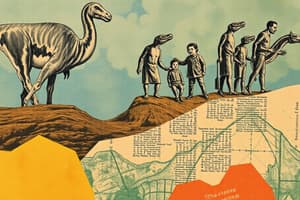Podcast
Questions and Answers
What is the definition of Geology?
What is the definition of Geology?
Study of the Earth, its materials, processes, and history.
Which of the following is a branch of Geology?
Which of the following is a branch of Geology?
- Historical Geology (correct)
- Urban Geography
- Cultural Geography
- Physical Geology (correct)
What does Geography study?
What does Geography study?
Earth's landscapes, environments, and relationships between people and their environments.
What is Plate Tectonics?
What is Plate Tectonics?
What processes are involved in Soil Formation?
What processes are involved in Soil Formation?
What type of landforms are created by geological processes?
What type of landforms are created by geological processes?
What role does geology play in natural resources?
What role does geology play in natural resources?
What is the study of Geomorphology?
What is the study of Geomorphology?
What does the study of Hydrology involve?
What does the study of Hydrology involve?
How do geological features influence climate?
How do geological features influence climate?
What is the significance of integrating geology and geography?
What is the significance of integrating geology and geography?
Flashcards are hidden until you start studying
Study Notes
Geology and Geography
-
Definition of Geology
- Study of the Earth, its materials, processes, and history.
-
Branches of Geology
- Physical Geology: Examines the materials of the Earth and the processes acting upon them.
- Historical Geology: Studies the origin and evolution of the Earth and its life forms through time.
-
Geography Overview
- Study of the Earth's landscapes, environments, and the relationships between people and their environments.
Key Concepts in Geography Related to Geology
-
Plate Tectonics
- Earth's outer shell is divided into large plates that move and interact.
- Causes earthquakes, volcanic activity, and mountain building.
-
Landforms
- Result from geological processes like erosion, deposition, and tectonic activity.
- Types include mountains, valleys, plateaus, and plains.
-
Soil Formation
- Process influenced by parent material, climate, organisms, topography, and time.
- Important for agriculture and ecology.
-
Natural Resources
- Geology provides essential resources (minerals, fossil fuels, water).
- Geography assesses their distribution and sustainable management.
Interaction of Geology and Geography
-
Geomorphology
- Study of landforms and the processes that shape them.
- Integrates physical geography with geological processes.
-
Hydrology
- The study of water, its distribution, movement, and properties.
- Geological features influence watershed dynamics and groundwater.
-
Climate Influence
- Geological features affect local climates (mountains can block rain).
- Geography studies the impact of climate on geological processes.
-
Human Geography
- Examines how human activity is influenced by geological features.
- Urban planning often considers geological stability and resources.
Applications of Geology in Geography
-
Environmental Management
- Geologists assess land and water resources for sustainable development.
- Helps in disaster risk reduction related to geological hazards.
-
Urban Planning
- Geological surveys inform construction, infrastructure, and resource management.
-
Conservation Efforts
- Understanding geology aids in preserving natural landscapes and biodiversity.
Importance of Integrating Geology and Geography
- Provides a comprehensive understanding of Earth's systems.
- Enhances the ability to address environmental challenges.
- Facilitates informed decision-making for resource management and urban development.
Definition and Branches of Geology
- Geology studies the Earth, its materials, processes, and historical development.
- Physical Geology focuses on Earth's materials and the processes affecting them.
- Historical Geology investigates Earth’s origin and the evolution of life over geological time.
Overview of Geography
- Geography encompasses the study of Earth's landscapes, environments, and human-environment relationships.
Key Concepts in Geography Related to Geology
-
Plate Tectonics:
- The Earth's outer shell comprises large, moving tectonic plates.
- These movements lead to earthquakes, volcanic activity, and mountain formation.
-
Landforms:
- Geologically formed through processes such as erosion, deposition, and tectonic forces.
- Common landforms include mountains, valleys, plateaus, and plains.
-
Soil Formation:
- Influenced by factors like parent material, climate, organisms, topography, and time.
- Essential for supporting agriculture and diverse ecosystems.
-
Natural Resources:
- Geology is a source of vital resources, including minerals, fossil fuels, and water.
- Geography plays a role in analyzing the distribution and sustainable management of these resources.
Interaction of Geology and Geography
-
Geomorphology:
- Examines landforms and their shaping processes, integrating both physical geography and geology.
-
Hydrology:
- Focuses on the distribution, movement, and properties of water.
- Geological characteristics can affect watershed behavior and groundwater systems.
-
Climate Influence:
- Geological features, such as mountains, can influence local climatic conditions by blocking precipitation.
- Geography assesses how climate impacts geological processes.
-
Human Geography:
- Explores the interplay between human activities and geological features.
- Urban planning incorporates geological stability and resource availability.
Applications of Geology in Geography
-
Environmental Management:
- Geologists evaluate land and water resources for sustainable development strategies.
- Assists in reducing disaster risks associated with geological hazards.
-
Urban Planning:
- Geological surveys guide construction, infrastructure development, and resource management.
-
Conservation Efforts:
- Knowledge of geology supports the preservation of natural landscapes and biodiversity.
Importance of Integrating Geology and Geography
- This integration offers a holistic understanding of Earth's systems.
- Enhances addressing environmental challenges effectively.
- Encourages informed decision-making in resource management and urban planning.
Studying That Suits You
Use AI to generate personalized quizzes and flashcards to suit your learning preferences.




